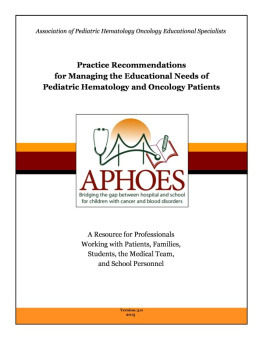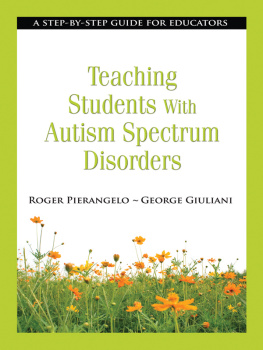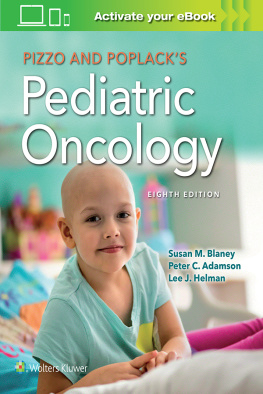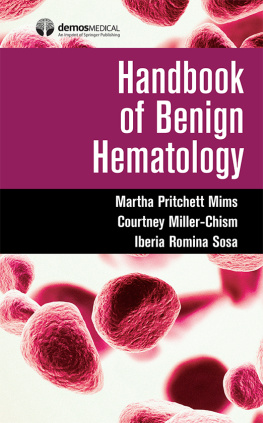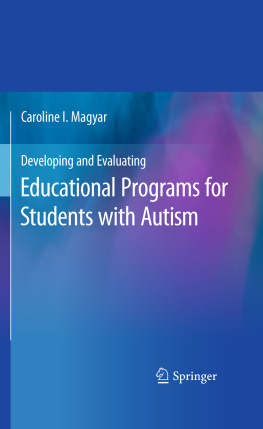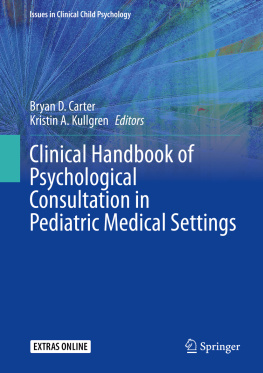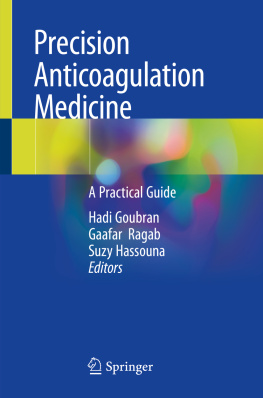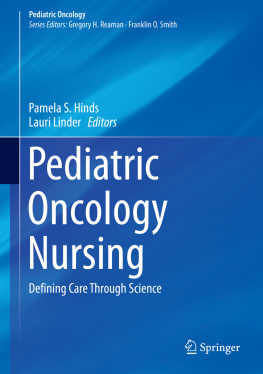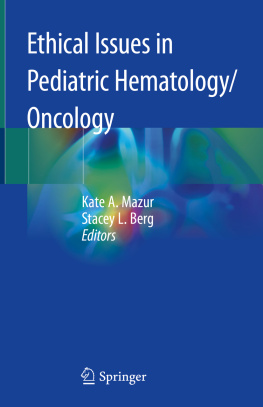ISBN: 978-1-4835342-9-9
Table of Contents
Preface
Children diagnosed with cancer or chronic blood disorders experience significant interruptions in school routines. Assistance should be provided to minimize the impact of illness and medical treatment on education. Assistance should also be provided to ease students transition back to the classroom when their health allows. Hospital-based school intervention programs and identified liaisons from the medical setting should work with school personnel to provide educational assessments, planning and interventions.
The Association of Pediatric Hematology Oncology Educational Specialists (APHOES) strives to bridge the gap between hospital and school through partnership, advocacy and communication. APHOES has developed practice recommendations to provide professionals and other organizations with a framework for developing school intervention programs to meet the needs of students with cancer or chronic hematologic disorders. The intent is to increase the availability of such services for patients receiving medical care throughout the United States and to encourage future efforts in the field to develop evidence-based standards of care.
Developing these practice recommendations was particularly challenging. There are few empirical studies of the educational difficulties experienced by pediatric hematology-oncology patients and of interventions targeting these challenges. Additionally, there are few published recommendations or guidelines for school intervention programs and professionals addressing the educational needs of children diagnosed with cancer or hematologic disorders. Therefore, the APHOES practice recommendations reflect primarily the consensus-based clinical experiences and expert opinions of the APHOES membership.
Some of the empirical work informing the development of the APHOES Practice Recommendations is cited below:
Barrera, M., Shaw, A. K., Speechley, K. N., Maunsell, E., & Pogany, L. (2005). Educational and social late effects of childhood cancer and related clinical, personal, and familial characteristics. Cancer, 104(8), 1751-1760. doi: 10.1002/cncr.21390
Daly, B. P., Kral, M. C., & Brown, R. T. (2008). Cognitive and academic problems associated with childhood cancers and sickle cell disease. School Psychology Quarterly, 23(2), 230-242. doi: 10.1037/1045-3830.23.2.230
Gerhardt, C. A., Dixon, M., Miller, K., Vannatta, K., Valerius, K. S., Correll, J., & Noll, R. B. (2007). Educational and occupational outcomes among survivors of childhood cancer during the transition to emerging adulthood. Journal of Developmental & Behavioral Pediatrics, 28(6), 448-455. doi: 10.1097/DBP.0b013e31811ff8e1
Koontz, K., Short, A. D., Kalinyak, K., & Noll, R. B. (2004). A randomized, controlled pilot trial of a school intervention for children with sickle cell anemia. Journal of Pediatric Psychology, 29(1), 7-17. doi: 10.1093/jpepsy/jsh002
Mitby, P. A., Robison, L. L., Whitton, J. A., Zevon, M. A., Gibbs, I. C., Tersak, J. M.,Mertens, A. C. (2003). Utilization of special education services and educational attainment among long-term survivors of childhood cancer. Cancer, 97(4), 1115-1126. doi: 10.1002/cncr.11117
Rey-Casserly, C., & Meadows, M. E. (2008). Developmental perspectives on optimizing educational and vocational outcomes in child and adult survivors of cancer. Developmental Disabilities Research Reviews, 14(3), 243-250. doi: 10.1002/ddrr.31
Schatz, J. (2004). Brief report: Academic attainment in children with sickle cell disease. Journal of Pediatric Psychology, 29(8), 627-633. doi: 10.1093/jpepsy/jsh065
Schatz, J., Brown, R. T., Pascual, J. M., Hsu, L., & DeBaun, M. R. (2001). Poor school and cognitive functioning with silent infarcts and sickle cell disease. Neurology, 56, 1109-1111.
The existing related practice guidelines reviewed during the development of the APHOES Practice Recommendations include:
Childrens Oncology Group. (2008, October). Long-term follow-up guidelines for survivors of childhood, adolescent and young adult cancers (Version 3). Retrieved from http://www.survivorshipguidelines.org/pdf/LTFUGuidelines.pdf
International Society of Paediatric Oncology. (2002, September). Childhood cancer-Guidelines for standards of treatment and care. Retrieved from http://www.siop.nl/about-siop/committees/ad-hoc-committees/standards-of-care-and-training-2002-document
Landier, W. (ed.) (2007). Establishing and enhancing services for childhood cancer survivors: Long-term follow-up program resource guide. Retrieved from http://www.childrensoncologygroup.org/index.php/research-257/survivorship-guidelines
Nathan, P. C., Patel, S. K., Dilley, K., Goldsby, R., Harvey, J., Jacobsen, C.,Armstrong, F. D. (2007). Guidelines for identification of, advocacy for, and intervention in neurocognitive problems in survivors of childhood cancer: A report from the Childrens Oncology Group. Archives of Pediatrics and Adolescent Medicine, 161(8), 798-806. doi: 10.1001/archpedi.161.8.798
National Collaborating Centre for Cancer. (2005, August). Improving outcomes in children and young people with cancer. Retrieved from http://www.nice.org.uk/guidance/csgcyp
Scottish Intercollegiate Guidelines Network. (2013). Long term follow up of survivors of childhood cancer: A national clinical guideline. Retrieved from http://www.sign.ac.uk/guidelines/fulltext/132/index.html
The following elements guided the development of the APHOES Practice Recommendations:
Health Questions
1. Do children with certain types of cancer or chronic blood disorders have a risk of developing educational difficulties?
2. What factors increase the risk of educational problems in children diagnosed with cancer or chronic hematologic disorders?
3. How can school intervention programs address the educational needs of children diagnosed with cancer or chronic blood disorders?
4. What type of learning problems or cognitive effects can develop in children diagnosed with cancer or chronic blood disorders?
5. What types of assessments, monitoring and interventions are recommended?
6. How can school intervention programs assist families and school personnel during palliative and bereavement care?
Target Population
School-aged children with chronic blood disorders or cancer.
Target Users
All professionals working with families, students, the medical team, and school personnel in managing the educational needs of children diagnosed with chronic blood disorders or cancer.
Funding Sources
The individuals involved in the development of the APHOES Practice Recommendations have no conflict of interest with respect to the development of this document. The APHOES Practice Recommendations were developed independently from any funding body.
Overview of Material
APHOES Practice Recommendations release dates: May, 2011. Version 1.0; September 2013. Version 2.0; and April 2015. Version 3.0
APHOES would like to express its appreciation and gratitude to Paula Robinson, M.D., MSc and the C17 Standards and Guidelines Committees School Re-entry Working Group for reviewing the APHOES Practice Recommendations and providing valuable feedback and suggestions.
Electronic Source
APHOES Practice Recommendations are available at www.aphoes.org .
Review and Updating
The APHOES Practice Recommendations for Managing the Educational Needs of Pediatric Hematology and Oncology Patients, Version 1.0 was issued in 2011 and updated to Version 2.0 in 2013. Version 3.0, formatted for electronic readers and digital distribution, is released in 2015. The APHOES Editorial Committee will review the Recommendations on a regular basis to determine need for updates. Updates will be noted on the APHOES website ( www.aphoes.org ). We suggest that professionals check this website regularly for the latest revisions and updates.

